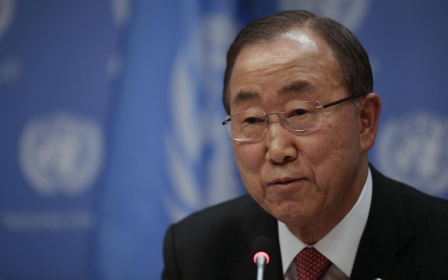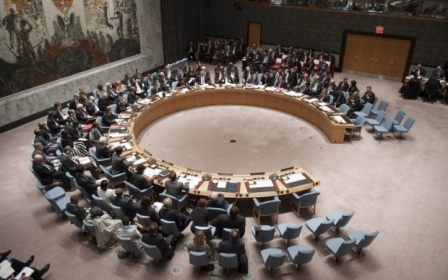US won't back Palestinian UN resolution

The United States will not support the current resolution put forward by the Palestinians setting the terms of a peace deal with Israel, a US official said Thursday.
Washington has seen the text of a draft resolution circulating in the UN Security Council and "it is not something that we would support," State Department spokeswoman Jen Psaki told reporters.
"We think others feel the same and we are calling for further consultations. The Palestinians understand that."
She pointed to a statement from Palestinian president Mahmud Abbas that he would support further consultations, adding US Secretary of State John Kerry had been holding discussions with different parties on Thursday.
She agreed the problem was the content of a Jordanian text that would set a 12-month timeline for wrapping up peace negotiations and a late 2017 deadline for an Israeli withdrawal from Palestinian lands.
"We wouldn't support any action that would prejudge the outcome of the negotiations or would set a specific deadline for withdrawal of security forces," Psaki said, adding that the parties were aware of US concerns.
Psaki stressed that "obviously the content is important."
"We've been clear about what our principles are, and the fact that we could support certain forms of resolution, but those discussions are private," Psaki added.
Washington has repeatedly vetoed Security Council resolutions seen as undermining its close ally Israel.
UN will 'take time' to decide on resolution
Negotiations on the draft UN resolution will take time, Jordan said Thursday, indicating that a Security Council vote was not imminent.
Jordan presented the measure on Wednesday to the UN Security Council on behalf of the Palestinians, who said they were open to negotiations on the text.
"It will take time," Jordan's UN ambassador Dina Kawar told reporters.
A final peace deal would pave the way to the creation of a Palestinian state with Jerusalem as a shared capital, according to the text.
"There is not the basis for consensus on the text as drafted and that is why we need to do some work," said a Security Council diplomat.
"The issue now is how do we get something that really does command consensus. The objective that we have is to achieve consensus, which means we want to have a text that everybody can agree," said the diplomat, who asked not to be named.
France, working with Britain and Germany, was pressing on with a separate text on reviving the peace process, but it was unclear when that effort would yield results.
"We are continuing our work on a consensus text. We are working on the European text and we will see if we can make progress," said a European diplomat.
With Israel deep in an election campaign for March polls, there is concern that the resolution could play into the hands of hardliners and that delaying UN action would be wise.
"Palestinians now feeling they want to rush ahead, the rest of us quite frankly not sure that is a good idea this side of the Israeli elections that we're now going to have in March," said a Western diplomat.
Diplomatic sources suggested the Palestinians may be willing to hold off on a Security Council vote if they get assurances that Israel will freeze settlement construction until a way forward can be decided.
Arab League hopes US will not veto resolution
The Arab League said Thursday it hoped the United States would not veto the draft resolution.
"We hope that the United States will not use its veto," said the Arab League's deputy secretary general for Palestinian affairs, Mohammed Sobeih.
"The use of the American veto will harm the Palestinian cause and will be used by extremists as an instrument to pursue settlement (of Jews in the occupied territories) and ruin the peace process," he told journalists.
A US veto risks angering key Arab allies, including partners in the US-led coalition carrying out air strikes against the Islamic State group in Syria and Iraq.
The latest round of Israeli-Palestinian peace talks, shepherded by Kerry, collapsed in April amid mutual recriminations.
This summer's Israeli offensive against in Gaza followed, and tensions have boiled over in the West Bank and east Jerusalem amid clashes between armed Israeli security forces and stone-throwing Palestinians.
Israel won't accept 'unilateral' Palestine bid
Prime Minister Benjamin Netanyahu said Thursday Israel would never accept the "unilateral" recognition of a Palestinian state.
In a statement from his office, Netanyahu accused Abbas of "thinking he can threaten us by taking unilateral steps" over statehood.
"He doesn't understand that his authority in the West Bank will be overturned by Hamas like it was in Gaza," the Israeli premier added.
"We will never accept unilateral diktats," Netanyahu said.
The Palestinian draft resolution, submitted on Wednesday to the UN in New York, sets a 12-month deadline for wrapping up negotiations on a final settlement and the end of 2017 as the timeframe for completing an Israeli withdrawal from Palestinian territories.
Israeli Foreign Minister Avigdor Leiberman also played down the chances of the Palestinians' UN bid achieving a breakthrough.
"Without Israel's agreement nothing will change," he said in a statement.
"The UN Security Council would do better to deal with the issues truly important to the safety and security of the citizens of the world... and not waste time on Palestinian gimmicks," Leiberman said.
Most Israelis would like to see Netanyahu replaced after March elections but, paradoxically, he is seen as most suitable for the job, an opinion poll said Thursday.
The survey conducted by the Dialog Institute and published by Haaretz newspaper, showed that 53 percent of those polled do not want Netanyahu to win a third consecutive term in office, for four in total.
Nevertheless, 34 percent agreed that the incumbent and head of the right-wing Likud Party is the most credible candidate and the most capable to be prime minister.
UN doubles estimate of destroyed Gaza homes
Meanwhile, the UN warned Thursday it was running out of funds to house families in Gaza, as it doubled its estimate of the number of homes damaged or destroyed in this summer's Israeli offensive.
"Unless the situation changes urgently, we will run out of funds in January, meaning we will not be able to provide rental subsidies to many affected families nor provide the support required to carry out repairs," said Robert Turner, the operations director for the UNRWA Palestinian refugee agency.
He said more than 96,000 homes were damaged or destroyed in the 50-day war, more than twice the UN's original estimate.
Based on satellite imagery and preliminary field work immediately after the war, "we estimated about 42,000 refugee family shelters had been affected by the war," he said.
"We now know that over 96,000 homes were damaged or destroyed."
Turner said more than 7,000 homes were completely lost, affecting some 10,000 families. An additional 89,000 homes were damaged, about 10,000 of them severely.
UNRWA has estimated $720 million (585 million euros) will be needed to provide rental subsidies to families with no alternative shelter, to rebuild destroyed homes and repair damaged ones.
However, only some $100 million has been pledged.
Without additional funds, "tens of thousands of refugee families will find themselves with inadequate shelter and no support during the hardest months of winter," Turner said.
The offensive, which ended on August 26, killed nearly 2,200 Palestinians, most of them civilians, and 73 people on the Israeli side, mostly soldiers.
Stay informed with MEE's newsletters
Sign up to get the latest alerts, insights and analysis, starting with Turkey Unpacked
Middle East Eye delivers independent and unrivalled coverage and analysis of the Middle East, North Africa and beyond. To learn more about republishing this content and the associated fees, please fill out this form. More about MEE can be found here.




